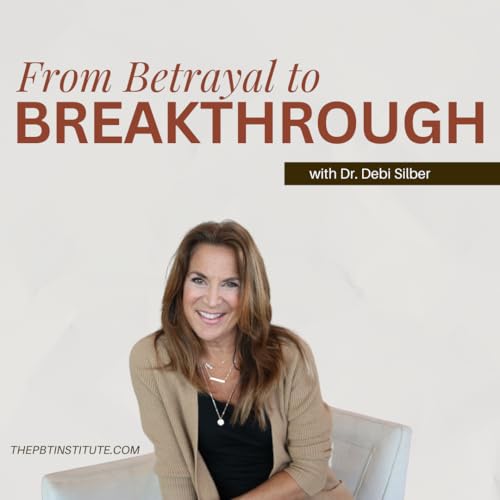In this solo episode, Dr. Debi shares 11 anonymized, real-world scenarios showing how unhealed betrayal quietly derails performance, leadership, health, and culture at work. From weight changes and gut issues to micromanagement, perfectionism, disengagement, and self-betrayal, you'll see how a personal rupture (even years old) can surface on the job—and what to do about it. You'll also hear research-backed prevalence stats (weight, gut, sleep) and a clear invitation to move from Stages 2–3 (shock and survival) into Stages 4–5 (healing and growth). Who this episode is for Professionals, leaders, and founders who feel "off" at work and can't trace why HR/people leaders noticing unexplained dips in performance, morale, or collaboration Anyone who suspects an earlier betrayal might still be shaping today's choices, health, and capacity Key concepts & signals Betrayal shows up at work physically (weight, gut, sleep), mentally (focus, overthinking), emotionally (hypervigilance, distrust). Nervous system hijack: After broken trust, people often swing to micromanagement, second-guessing, isolation, or over-preparation. Stages matter: Creativity, confidence, and connection typically reliably return as you move into Stages 4–5 of the 5-Stage model. Research snapshots (from Debi's community data): Weight/eating struggles: ~47% Gut issues (IBS/Crohn's/constipation/diarrhea): ~45% Sleep problems: ~68% Case snapshots (anonymized) Sarah — Weight & confidence spiral Discovery of husband + best friend affair → stress eating → +40 lbs, pre-diabetes, energy crash. Missed two promotions; client-facing confidence plummeted. Marcus — Gut & career derailment Brother's $50k "investment" betrayal (borrowed from 401k) → nausea → IBS, 30 missed days in 6 months, $12k out-of-pocket care → transfer to lower-paying support role. Jennifer — From empowering to micromanaging Daughter's addiction/deceit eroded trust → hypervigilance, excessive approvals, morale drop → $30k demotion. David — Cultural catalyst to clock-watcher Father covertly rewrote will for estranged sister → emotional numbness → stopped mentoring/initiatives → ~25% drop in departmental satisfaction. Lisa — Anxiety, over-prep, stalled growth Fiancé + maid of honor affair weeks before wedding → panic in meetings, medical leave, therapy costs → over-preparation and hesitation → lost Senior Manager promotion. Tom — Creativity collapse Close friend's emotional affair with his partner during family caregiving → withdrew creative risk-taking → lost edge in pitches → 3 major accounts (~$2M) missed. Rachel — Sleepless CEO Sister's manipulation of elderly mother & finances → insomnia, ruminations → poorer board-level decisions, investor strain, performance dip; sleep meds added side-effects. Kevin — Isolation after double betrayal Wife left for best friend → withdrew from people, closed-door leadership → cross-functional effectiveness down ~40%; silos and delays multiplied. Maria — Paralysis by over-analysis Business + romantic partner embezzled to fund secret life → hyper-checking, documentation glut → missed time-sensitive opportunities; costly lost trading advantage. Robert — Purpose lost, pipeline thins Adult son (aided by brother) sued him for "emotional damages" → quit mentoring/junior development → leadership pipeline weakened; burnout → early retirement. Andrea (self-betrayal) — Successful but misaligned Pressured away from teaching into law → chronic fatigue, migraines, disengagement, ~30% billable drop, ~$800k lost potential revenue → leave of absence. The cost wasn't only professional—it was existential. How to spot it (self-check) "I don't recognize how I lead or work anymore." (micromanaging, over-prepping, perfectionism) "My body is louder than my calendar." (gut flares, migraines, insomnia before big decisions) "I'm here but not really here." (numbness, disengagement, loss of initiative/mentoring) "I don't trust my read on people." (multiple confirmations for simple tasks, second-guessing) "I'm productive—but always late." (hyper-vigilant thoroughness that kills timeliness) "I'm successful—and empty." (self-betrayal: achievement without meaning) Try this: 6 reflection prompts Which case felt uncomfortably familiar—and why? Where does betrayal show up most for you: body, mind, or relationships at work? What do you over-do (control, analyze, isolate) to feel safer—and what does it cost? Which responsibility did you stop (mentoring, initiating, pitching) after the rupture? What would "Stage 4–5 me" do differently this week? If self-betrayal is the theme, what small act of alignment could you take in 72 hours?...
続きを読む
一部表示
 42 分
42 分 35 分
35 分 21 分
21 分 30 分
30 分 2025/10/1328 分
2025/10/1328 分 2025/10/0629 分
2025/10/0629 分 2025/09/2932 分
2025/09/2932 分 35 分
35 分
